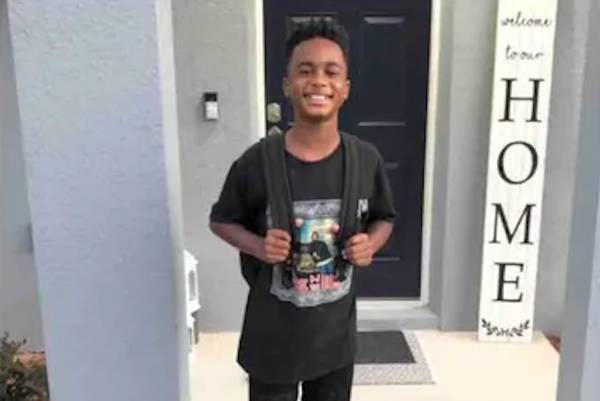DENVER — Two state senators, a Republican and a Democrat, sit down on a dais in a dimly lit conference room at the Colorado Convention Center here and start talking. The two men are friends — they tease each other, call each other “dude” — and they’re sick of partisan fights.
So, they decide to try something radical. Each will vote with the opposing party on two of the most contentious issues in American politics: abortion and gun rights.
“If we don’t do something different, then it’s the same old script,” the Democrat said.
That’s the plot of a short play by New Mexico state Sen. Bill O’Neill, a Democrat, which was staged last week at the annual summit of the National Conference of State Legislatures, a nonpartisan organization that includes sitting legislators from every U.S. state and territory. It was one of several sessions that encouraged lawmakers to reflect on partisan battles and how they might reach a detente.
Bipartisan collaboration still exists in state legislatures, lawmakers attending the summit said. But they also said it’s getting harder to reach across the aisle, leading to either more gridlock or hyperpartisan legislation.
Old traditions of bonhomie are breaking down, and lawmakers risk blowback from voters, media outlets and their own caucus when they work with the other party.
Partisan animosity in the Nebraska legislature has increased over the past four years, said state Sen. Ben Hansen, a Republican. When he talks to lawmakers who served a decade ago or more, they say the legislature’s culture has completely changed.
Democrats and Republicans used to get together for drinks and work things out, Hansen said. “That doesn’t happen anymore.”
Some lawmakers at the conference acknowledged some bipartisan traditions make them uneasy.
After Connecticut’s annual session ends at midnight, the atmosphere traditionally shifts from bitter fighting to bipartisan celebration, said state Sen. Will Haskell, a Democrat and deputy president pro tempore, during a panel focused on young lawmakers’ experiences.
He said that although finding common ground is important, it’s hard to be chummy with lawmakers when you are convinced that their political positions could hurt your family.
“To this day, I see both sides of it, and I really struggle with that 12:01 moment,” he said. “At the end of the day, what we do is not a game.”
The growing tension in legislatures reflects the national mood. Republicans and Democrats increasingly see the opposing party as not just wrong, but dangerous. Before the 2020 election, 90% of supporters of then-candidate Joe Biden and 89% of supporters of then-President Donald Trump said that the United States would suffer lasting harm if their preferred candidate lost, according to a Pew Research Center poll (The Pew Charitable Trusts funds the center and Stateline).
Some lawmakers at the summit said that in this hyperpartisan climate, even talking to a member of the opposing party is risky.
“With the Twitter world, the Facebook world, every time somebody takes a picture of you talking to someone on the other side of the aisle, it becomes problematic, politically, for you,” said Virginia Del. Terry Kilgore, a Republican and House majority leader, during a panel discussion on resolving partisan differences.
“In this world, it’s becoming harder and harder to go to the middle, for each party,” he said, “but it’s something that we have to aspire to do.”
Many moderate lawmakers are losing their seats or being gerrymandered out of them. Lawmakers who want to stay in office are under pressure to toe the party line, both with their votes and their public statements.
It doesn’t help that in 37 states, one party controls both houses of the legislature and the governor’s office. In these so-called trifecta states, lawmakers in the majority have less incentive to reach across the aisle, and lawmakers in the minority have very little power to influence legislation.
Oklahoma state Rep. John Waldron, a Democrat, teacher and House minority floor leader, said he’s been able to work with GOP lawmakers on some education bills, such as a measure to create incentives for teacher training.
But it hasn’t been easy for him to convince GOP lawmakers to attend the meetings of the bipartisan educators’ caucus he co-chairs. Oklahoma Democratic state Rep. Meloyde Blancett said it’s been even harder for her to get GOP lawmakers to join her bipartisan women’s caucus.
“The leaders of the House warned the Republican women that they had better not be seen with us,” she said.
Friendly relationships — and strategically written bills — can open the door to bipartisan cooperation, lawmakers said.
Florida state Rep. Amber Mariano Davis, a Republican, recently championed a tenant safety bill sponsored by Democratic state Rep. Robin Bartleman. Davis told Stateline the bill addressed an important public safety issue. It helped that she also got along with Bartleman.
“There are some members of the other party that will stand up all session and talk about what terrible human beings we [Republicans] are,” Davis said.
O’Neill, a writer who has published two novels and two books of poetry, got the idea for the play last year. That’s when his friend, New Mexico Republican state Sen. Cliff Pirtle, convinced him to vote against a bill that would restrict use of a pesticide harmful to bees. Pirtle had explained to O’Neill that the law would hurt farmers.
The “no” vote outraged some of his constituents, O’Neill said. “I get a flood of emails — ‘Hey, what’s your problem?’” he said. “That’s where I started, it started with that.”
Bipartisanship is also an issue close to his heart. “It’s just something that I deeply care about, bipartisanship,” O’Neill told Stateline. “We’re living this, and it’s so timely.”
O’Neill and Pirtle bonded during bipartisan social events, they said, such as playing for the state Senate’s charity basketball team. Although O’Neill is a progressive Democrat who represents parts of Albuquerque, and Pirtle is a libertarian-leaning Republican who represents a rural area, they realized they had a lot in common.
They both enjoy talking to people who think differently than they do. And they share what may be an unusual trait in politicians: They don’t really like conflict.
“I am a staunch Republican, I feel like less government is the better government,” Pirtle told Stateline a few days before the play’s Denver debut. “But I think if two reasonable people can sit down and have a good conversation over a cold beer, I think a lot of issues can be resolved.”
The play — which O’Neill said is still a work in progress — lasts about 40 minutes and is a staged reading of scripted dialogue. Two actors sit next to each other, reading from binders and gesturing occasionally to stock images displayed on a screen. After casting their controversial votes, they take it in turns to walk to a podium and explain themselves, as a sound system plays the boos and wails of their angry supporters.
After the Denver performance, O’Neill and Pirtle acknowledged to the show’s 70-odd attendees that despite their friendship, they hardly ever vote together (and they’ve certainly never swapped votes on hot-button issues).
Besides the bee bill, Pirtle could recall only one other instance: This year, he and O’Neill backed a bill to create the New Mexico Opportunity Scholarship, a tuition-free college program. Just as O’Neill received angry emails after his bee vote, so Pirtle faced blowback for voting with the Democrats and some Republicans on free college.
“I took huge hits from all the bloggers and the posts and things,” Pirtle said, at least initially. He voted in favor because the bill would fund vocational training scholarships, and workforce training is badly needed in his district, he said.
O’Neill’s play ends on a somber note. The two lawmaker characters know they’ve probably ruined their political careers with their vote-switching experiment.
“I look into the future and do not like what I see,” the Democratic character says. “In fact, I cannot see anything except a blank. We are so freaking divided.”
Then a video clip plays of a rodeo queen riding around an arena holding an American flag. O’Neill finds the video moving. But it’s a lonely scene. The clip is hushed, and the arena is empty.
———







